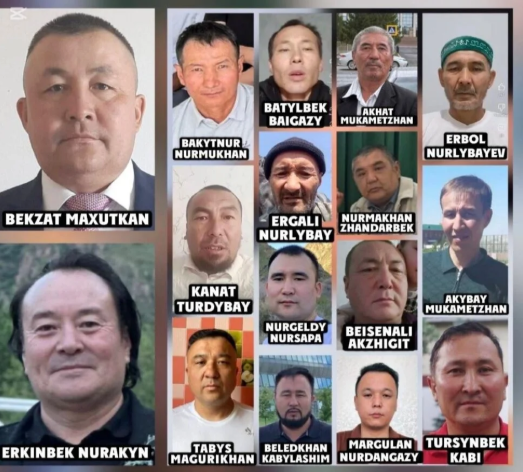Kazakhstan’s Detention of Xinjiang Witnesses: Beijing’s Long Arm Reaches Across the Border
- 24. 11. 2025
- Minut čtení: 4
Protesting against China now results in activists being detained—and held in a unclear legal situation.
November 24, 2025
by Tilek Niyazbek and Kalbynur Auken
Kazakhstan, a country that likes to present itself as a bridge between East and West, has once again shown how fragile that bridge can be when Beijing leans too heavily on one side. Sixteen members of the Atajurt Kazakh Human Rights organization—together with several eyewitnesses to the Xinjiang concentration camps—were recently arrested in Almaty and other cities. Their crime? Bearing witness, burning flags, and demanding justice.
Atajurt is no fringe group. It has painstakingly collected and recorded more than 10,000 video testimonies from survivors and relatives of detainees in Xinjiang. It was the first organization to bring to light the Chinese Communist Party’s crimes against humanity in the region. For years, its activists have been harassed, fined, and detained. Now, the arrests have escalated.
The immediate trigger was a protest near the Dulata border crossing, where more than forty Atajurt members gathered peacefully. They burned Chinese flags and portraits of Xi Jinping, chanting anti‑CCP slogans. Their demands were clear, and they were threefold:
First, release Alimnur Turganbay, a Kazakh citizen, born in Xinjiang, who had meticulously completed every bureaucratic step to cancel his Chinese household registration and passport. On July 23, 2025, he was arrested at Dulata by the Ili Kazakh Autonomous Prefecture’s State Security Brigade. His whereabouts remain unknown. His wife, Guldaria Sherizat, has become a symbol of resilience. Arrested fifteen times by Kazakh police, fined more than US$2,300, and subjected to constant surveillance along with her three daughters, she continues to petition the Ministry of Foreign Affairs. Her pleas have been ignored.
Second demand: end visa‑free entry for Chinese citizens. Protesters denounced the CCP’s economic and ideological infiltration. Chinese state‑owned companies have bought vast tracts of Kazakh land and real estate. Mining firms exploit underground resources, pollute rivers, and leave communities seething. Social media in Kazakhstan is filled with resentment, even as official outlets in both countries trumpet “friendly cooperation.”
Third request: free all Kazakhs, Uyghurs, and Kyrgyz in Xinjiang camps. The demand is sweeping, but it reflects the reality: thousands remain detained in internment facilities, their families silenced or intimidated.
The Kazakh authorities responded with arrests. Sixteen activists were taken into custody. Yet, in a twist that reveals the murky nature of the crackdown, no formal arrest warrants have been issued to date. Everything remains opaque.
Some activists believe the government is testing the waters—waiting to see whether Western democracies and human rights organizations will react. If the world remains silent, harsher measures will follow, designed to please Beijing.
Pro‑government media outlets and social accounts have already begun to shift the narrative. They claim that administrative arrests have been converted into criminal prosecutions. Yet, again, no official documents have surfaced. The activists are trapped in a Kafkaesque limbo: accused, but not formally charged; detained, but not legally processed.
There is geopolitics in these arrests. Kazakhstan’s government has cultivated an image of partnership with China, celebrating infrastructure projects and trade deals. But beneath the surface, resentment runs deep.
Ordinary Kazakhs see Chinese companies buying land, polluting mines, and dominating markets. They see Beijing’s ideology creeping into schools and media. And they see their own government bending under pressure, sacrificing citizens’ rights to maintain “friendly ties.”
Activists, by burning flags and chanting slogans, pierced that façade. Their protest was not only about one man, Alimnur Turganbay. It was about sovereignty, dignity, and the right to speak without Beijing’s permission.
The arrests now pose a test—not only for Kazakhstan but for the international community. If Western democracies remain indifferent, the Kazakh authorities will interpret silence as a green light. Already, activists fear that harsher measures are coming.
Kazakhstan’s balancing act between China and the West has always been precarious. But when citizens are detained without warrants, when wives are fined for demanding their husbands’ release, when daughters are surveilled for their mother’s activism, the balance tips into repression.
This is the story of a small group of determined activists who dared to document the truth about Xinjiang. Their videos gave voice to the voiceless. Their protests demanded justice. And now, their arrests reveal how far Beijing’s shadow stretches—across borders, into courts, into families.
Serikzhan Bilash, the fiery founder of Atajurt, now operates from the United States, where he wages a relentless campaign against three targets at once: the CCP, Moscow’s imperial ambitions, and Kazakhstan’s own authoritarian rulers. His biography is a litany of repression:
arrests, endless administrative prosecutions, and three criminal charges designed to silence him. Bilash openly warns that the regime in Astana—eager to please both Beijing and Moscow—will not stop until every member of Atajurt is rounded up. His appeal is stark: unless the international community pays attention, Kazakhstan’s pro‑Beijing, pro‑Russian government will succeed in extinguishing one of the few voices that dared to document Xinjiang’s crimes.
Kazakhstan may wish to present itself as neutral, pragmatic, cooperative. But neutrality ends when citizens are jailed for speaking out. Pragmatism becomes complicity when silence is rewarded with trade deals. Cooperation becomes surrender when Beijing dictates who may protest and who must disappear.
The fate of Alimnur Turganbay, of Guldaria Sherizat, of the sixteen detained activists, is not only a Kazakh issue. It is a measure of whether the world will stand against repression—or allow Beijing’s long arm to tighten its grip unchecked.
Source: bitterwinter.org







Komentáře